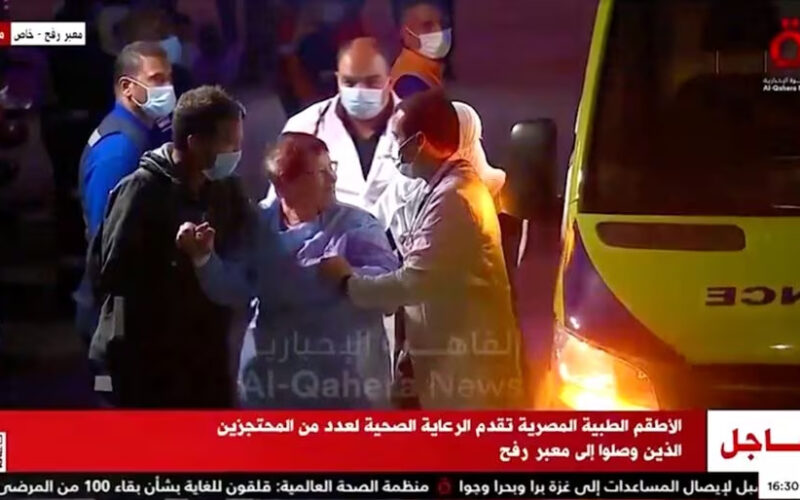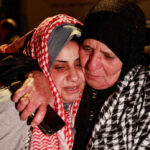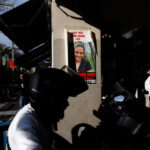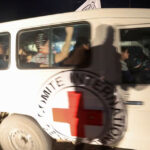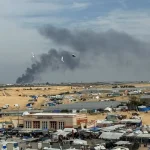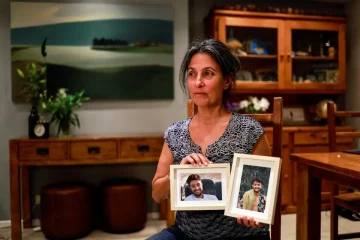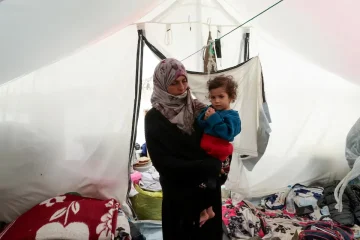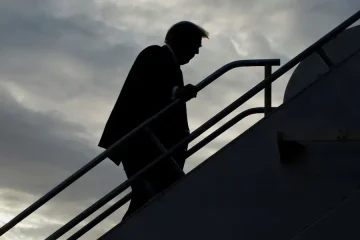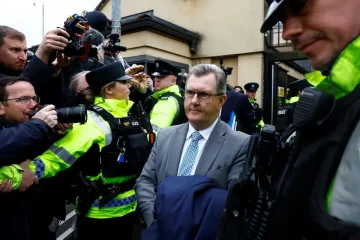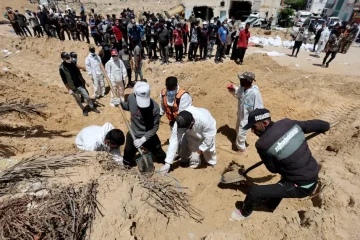HAMAS fighters released 24 hostages during the first day of the war’s first truce, including Israeli women and children and Thai farm workers, after guns fell silent across the Gaza Strip for the first time in seven weeks.
The hostages were transferred out of Gaza and handed over to Egyptian authorities at the Rafah border crossing, accompanied by eight staff members of the International Committee of the Red Cross (ICRC) in a four-car convoy, the ICRC said.
Qatar, which acted as a mediator for the truce deal, said 13 Israelis had been released, some with dual nationalities, plus 10 Thais and a Filipino. Thirty-nine Palestinian women and children were released from Israeli jails in return for the 13 Israelis, Qatar said.
“The deep pain that family members separated from their loved ones feel is indescribable. We are relieved that some will be reunited after long agony,” said Fabrizio Carboni, the ICRC’s regional director for the Near and Middle East.
Israel released the names of the Israeli hostages, which included four children accompanied by four family members, and five other elderly women.
“The released hostages underwent an initial medical assessment inside Israeli territory. They will continue to be accompanied by IDF soldiers as they make their way to Israeli hospitals, where they will be reunited with their families,” the military said.
Prime Minister Benjamin Netanyahu said in a recorded video message: “We have just completed the return of the first batch of our hostages. Children, their mothers and other women. Each and every one of them is a world in itself. But I stress to you, the families, and to you, citizens of Israel: We are committed to returning all our hostages.”
Under the terms of the four-day Israel-Hamas truce, 50 women and children hostages are to be released over four days, in return for 150 Palestinian women and children among thousands of detainees in Israeli jails. Israel says the truce could be extended if more hostages are released at a rate of 10 per day.
The first 13 released on Friday were to be exchanged for 24 Palestinian women and 15 teenagers.
A source briefed on the negotiations said the release of the Thai workers, who were all men, was unrelated to the truce negotiations and followed a separate track of talks with Hamas mediated by Egypt and Qatar.
Thai and Filipino farmworkers employed in southern Israel were among around 240 hostages dragged back to Gaza by gunmen when Hamas fighters launched a killing spree on October 7.
Thai Prime Minister Srettha Thavisin said in a social media post that 12 Thai workers had been freed, two more than the figure given by the Qataris. No reason for the discrepancy was given.
GAZANS VENTURE OUT IN TRUCE
Earlier on Friday, combat between Israeli troops and Hamas fighters halted for the first time in seven weeks under the truce.
No big bombings, artillery strikes or rocket attacks were reported, although Hamas and Israel both accused each other of sporadic shootings and other violations. Both said the war would resume on full throttle as soon as the truce was over.
In Khan Younis town in southern Gaza, streets filled with people venturing out of homes and shelters into a landscape of buildings flattened into heaps of rubble. Displaced families with small children carried belongings in plastic bags, hoping to return at least temporarily to homes they had abandoned earlier in the war.
“I am now very happy, I feel at ease. I am going back to my home, our hearts are rested,” said Ahmad Wael, smiling as he walked carrying a mattress balanced on his head. “I am very tired of sitting without any food or water. There (at home) we can live, we drink tea, make bread.”
In northern Gaza’s combat zone, viewed from across the fence in southern Israel, there was no sign of the warplanes that have thundered through the sky for weeks, explosions on the ground or the contrails of Hamas rocket fire. Just one plume of smoke was visible in the early afternoon.
Columns of Israeli tanks rolled away from the Gaza Strip’s northern end in the morning, while aid trucks entered from Egypt at the southern end.
Additional aid is to flow into Gaza, which has been gripped by a humanitarian crisis under weeks of Israeli bombardment that has killed thousands of Palestinians.
Hamas confirmed that all hostilities from its forces would cease. But Abu Ubaida, spokesperson for Hamas’ armed wing, later stressed that this was a “temporary truce”.
In a video message, he called for an “escalation of the confrontation…on all resistance fronts”, including the Israeli-occupied West Bank.
Israeli Defence Minister Yoav Gallant vowed a similar return to fighting: “This will be a short pause, at the conclusion of which the war (and) fighting will continue with great might and will generate pressure for the return of more hostages.”
Israel launched its assault on Gaza after Hamas fighters burst across the border fence into southern Israel on Oct. 7, killing 1,200 people and seizing about 240 hostages, according to Israeli tallies.
Since then, Israel has rained bombs on the Hamas-ruled enclave, killing some 14,000 Gazans, around 40% of them children, according to Palestinian health authorities.
Hundreds of thousands of Gaza’s 2.3 million people have fled their homes to escape the violence as conditions grew ever more desperate, with food, drinking water, fuel and other basic supplies running short.
Israel has told displaced Gazans not to attempt to return to the northern part of the Gaza Strip, the focus of its ground campaign since the start of this month.
Gaza residents said the Israelis had dropped leaflets warning people not to travel north and had fired over the heads of some people who were trying to get back into Gaza City.

